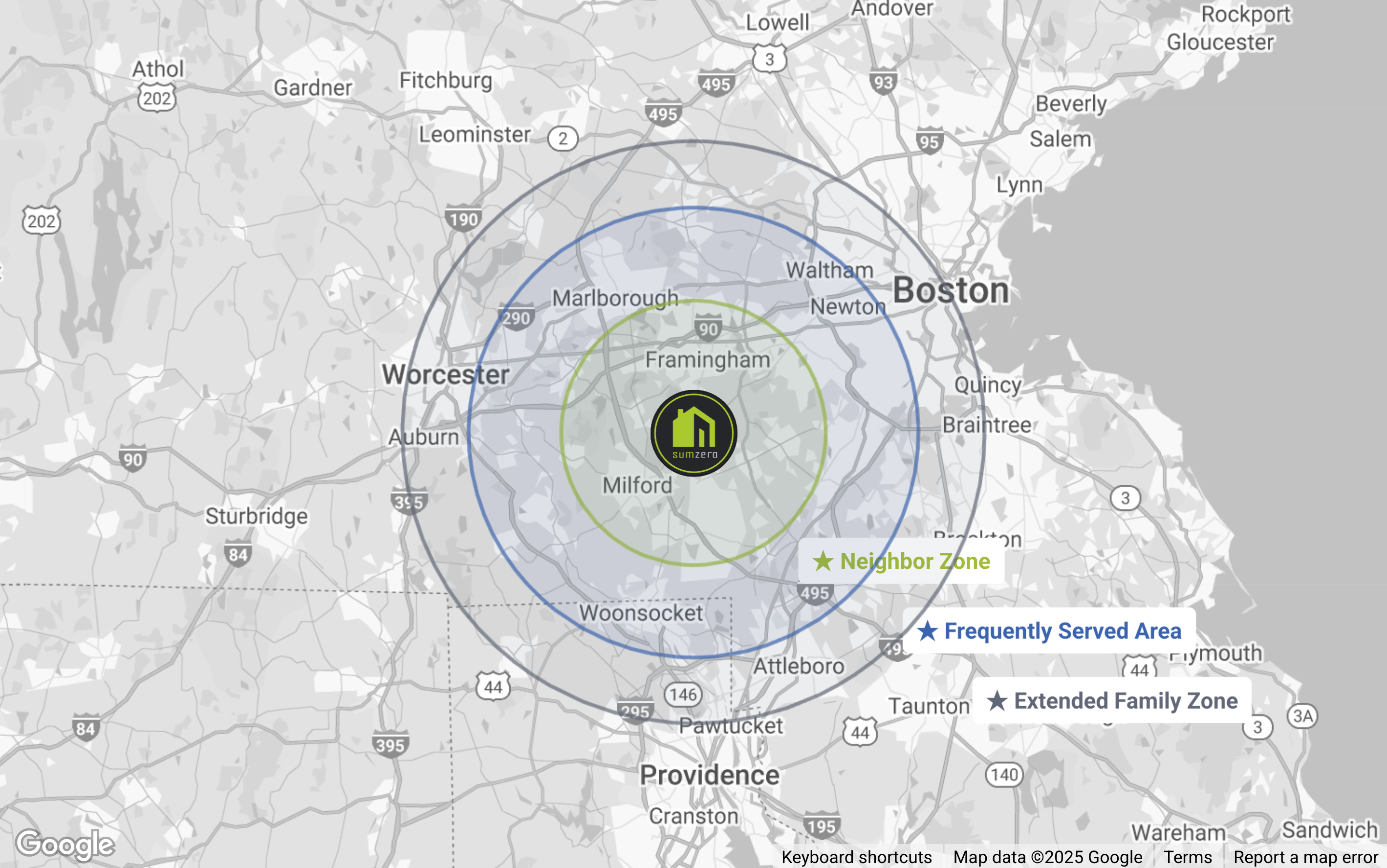Energy Recovery Ventilators | Millis, MA
Energy recovery ventilators are whole-house air exchanger systems that improve indoor air quality while reducing energy costs by efficiently balancing fresh air intake and stale air exhaust. Perfect for Millis, MA homes, ERV systems support healthier living by enhancing your home ventilation system without sacrificing energy efficiency.


Breathe Cleaner With Energy Recovery Ventilators in Millis, MA
Tucked between vibrant suburban life and natural beauty, Millis, MA is known for its unique mix of historic homes and newly constructed residences. While the close-knit community and New England charm offer an incredible quality of life, homeowners here face familiar concerns tied to indoor comfort—stuffy air in winter, high humidity levels in summer, and constantly rising utility bills.
This is where energy recovery ventilators (ERVs) step in as a smart, efficient home improvement. Designed to improve air quality control while optimizing home energy efficiency, ERV systems are especially relevant in Millis where distinct seasonal shifts and airtight homes can restrict airflow and contribute to indoor air pollution. Whether you're spending winter sealed up indoors or trying to keep cool during humid July afternoons, an ERV can help you breathe easier without compromising comfort or energy savings.
Let’s explore what ERVs are, how they work, and why they’re an essential upgrade for homes in Millis.
How Energy Recovery Ventilators Work in Millis MA Homes
The Basics of ERV Systems
Energy recovery ventilators are advanced home ventilation systems that exchange stale indoor air with fresh outdoor air, all while conserving the energy used to heat or cool your home. They’re ideal for homes in climates like Millis, where cold winters and humid summers are the norm.
ERVs operate using a heat exchanger core that transfers heat and moisture between incoming and outgoing air. This process not only keeps your interior temperature more consistent but also maintains balanced ventilation, ensuring air doesn’t become too dry or too humid.
Seasonal Benefits for Millis Residents
- In the winter, ERVs recover heat from outgoing air, transferring it to cold incoming air.
- In the summer, the system decreases humidity and pre-cools the air drawn in from the outside.
This makes ERVs perfectly suited for the local climate where frigid winters and sticky summers can strain HVAC systems and undermine indoor air comfort.
Compatible With Millis Home Styles
From older Colonial homes that have undergone renovations to newer, tightly sealed constructions designed for energy savings, ERVs can be installed with minimal disruption. Many homes built in Massachusetts after 2009 already meet air-sealing codes, which is where the integration of an ERV becomes essential; otherwise, tightly closed homes can trap pollutants, moisture, and allergens indoors.
“In Millis, the shift toward tighter home envelopes means homeowners need smarter ventilation strategies. ERVs provide fresh air while keeping energy bills in check.”
—Local HVAC Specialist, MetroWest Area
ERV Systems Are Key to Whole-House Ventilation in Millis
Cleaner Indoor Air Year-Round
With more time being spent indoors—especially during New England’s cold season or allergy-heavy spring—having clean indoor air is critical. ERVs effectively reduce:
- Carbon dioxide buildup
- Pet dander and allergens
- Volatile organic compounds (VOCs)
- Mold-promoting humidity
By expelling stale indoor air and replacing it with filtered outside air, these whole-house air exchanger systems improve overall air quality control and reduce health risks associated with poor ventilation.
Energy Efficiency That Pays Off
Installing an ERV is not only a health investment but an energy-conscious decision. Because the system transfers heat and moisture, it eases the burden on your existing heating and cooling equipment, enhancing home energy efficiency and bringing down utility costs.
Homeowners in Millis may also be eligible for rebates and financial incentives through Mass Save’s energy-efficiency programs. These local initiatives sometimes cover part of the cost for ventilation upgrades, especially when replacing aging HVAC systems or renovating a property for improved performance.
Learn more about ventilation and energy-efficient technologies from the U.S. EPA
Ideal for Modern and Older Homes Alike
- For recently built homes around Millis with tight envelopes, ERVs help meet indoor air quality standards and building codes.
- In updated older homes, they help manage excess moisture and eliminate air contaminants introduced during construction or renovation.
“Whether you live near Causeway Street or alongside the Charles River, any home in Millis can benefit from the ventilation and energy-saving features of an ERV.”
—Certified Residential Energy Auditor, Norfolk County
Comparing Home Ventilation Systems: Why Choose an Energy Recovery Ventilator?
ERV vs HRV: What’s the Difference?
While both ERV (Energy Recovery Ventilator) and HRV (Heat Recovery Ventilator) units are designed to exchange indoor and outdoor air efficiently, they operate a bit differently. The key difference lies in moisture control:
- ERVs transfer both heat and humidity, making them ideal for Massachusetts climates where summers are humid.
- HRVs transfer only heat, which is more suited to drier regions or exclusively winter climates.
For homeowners in Millis dealing with muggy summer air and dry winter static, ERVs offer more holistic ventilation benefits.
Better Than Exhaust-Only Systems
Many older ventilation solutions rely solely on exhaust fans to move air. However, without a balanced intake of outdoor air, this creates negative pressure, pulling in air from attics, basements, or garages—often contaminated areas. ERVs offer balanced ventilation, supplying as much air as they extract, ensuring comfort, health, and safety throughout your entire home.
Integrates with Existing HVAC Infrastructure
Most modern ERVs are designed to integrate seamlessly with central HVAC systems, ductwork, and even standalone setups in homes without ducts. Homeowners can customize settings based on occupancy, time of year, or personal preference—there’s flexibility without compromising on home energy efficiency or comfort.
“Our local experience in Millis has shown that pairing an ERV with energy-efficient HVAC systems brings measurable savings. Smart, long-term ROI for any homeowner.”
—HVAC Installation Team Lead, Millis-MA
Why Energy Recovery Ventilators Are So Valuable in Millis, MA
Local Climate Conditions Shape the Need
The humid continental climate of Millis delivers cold, dry winters and warm, sticky summers. In such a setting, it’s common to see condensation on windows, mold growth in basements, or excessively dry indoor air when heaters run at full capacity. An energy recovery ventilator balances these extremes by adjusting the humidity and temperature of incoming air, improving indoor conditions no matter the weather outside.
Massachusetts Building Codes and Air Quality Guidelines
Energy codes in Massachusetts are tightening. Since the state follows the Stretch Energy Code in many municipalities—including Millis—new construction and major renovations must comply with more rigorous standards for energy and ventilation performance. ERV systems meet these requirements, and they’re increasingly becoming part of permitted upgrades during remodeling and system replacements.
Homes with High Insulation or Sealed Designs
Houses that have undergone insulation upgrades, window replacements, or weatherization improvements (including those through Mass Save audits) often reduce natural air flow to cut down on drafts. While this boosts insulation performance, it may trap pollutants indoors. An ERV system reintroduces fresh air without compromising those efficiency gains.
What to Expect During an ERV Installation
Assessment & Sizing for Your Millis Home
The first step involves evaluating your home’s current airflow, moisture levels, and layout. Properly sizing an ERV system based on square footage, ductwork configuration, and occupancy ensures consistent, healthy airflow throughout all living spaces.
Ducted vs. Ductless Options
- For homes with full HVAC systems, ducted ERVs can be integrated directly into existing ductwork.
- In homes without central air, ductless or localized ERV units are available that serve single zones and rooms.
Installation usually takes just one to two days and doesn’t require major construction if planned appropriately.
Maintenance and System Longevity
ERV systems are relatively low maintenance. Regular cleaning of filters, checking airflow paths, and inspecting the heat exchanger core (usually annually) extends performance and maximizes benefits. Most well-maintained ERVs have a lifespan of 10–15 years, making them a durable indoor air investment.
Making the Smart Choice: Energy Recovery Ventilators for Your Millis Home
Whether you live in a renovated century-old home on Main Street or a modern townhome near Milliston Commons, improving your ventilation isn’t just a comfort upgrade—it’s a necessity for health, safety, and efficiency. ERVs are the cornerstone of modern whole-house air exchanger solutions, offering an ideal balance between air quality control and home energy efficiency.
From combatting seasonal extremes to meeting Massachusetts building codes, installing an energy recovery ventilator ensures you and your family benefit from fresher air and smarter energy use—all year long.
What Local Homeowners Are Saying
See how SumZero has helped local homeowners stay comfortable year-round with energy-efficient heat pump solutions.
Not Sure Where to Start? We’ll Guide You
Let our experts design the right heating and cooling solution—customized for your comfort, your layout, and your energy goals. No pressure. Just clarity.
Request FREE ESTIMATE









